
Denial is the effect of denying.
Negation is the result of denying : indicating that something does not exist or that it lacks veracity . The term comes from the Latin negatio .
This concept, therefore, mentions the deprivation or insufficiency of something. In the field of grammar , negation is a category that includes those terms that are used for this purpose and can be considered as an element of linguistics that is used to negate an expression or a component of a sentence. For this, an adverb , a phrase or another kind of word is used. From denial, it is maintained that something does not exist or that an action does not take place.
It is common for denial to occur from the preposition of the negative adverb "no" . For example: "I'm not going to go to Mariana's birthday celebrations," "I don't have any more money in my savings account," "I haven't said a word about it." Although it is also common for it to be constructed with adverbs such as "never" ( "I have never hit that boy" ) or "nothing" ( "The relationship left nothing in my being" ), or through verbs that imply it ( "I deny that there was expressed such a thing" , "He refused to comply with the order imposed by his boss" ).
Negation in logic
For classical logic , which accepts only two possible truth values, negation is an operation by which we convert a true proposition into false, and vice versa.
In the case of intuitionistic logic , however, the possibilities are expanded, requiring evidence to determine the veracity of a statement; Therefore, the denial of a proposition will be one that can be proven through refutations of the first. For Kripke's semantics , also known as relational and which emerged in the late 1950s, the negation of a proposition is its complement.

For psychology, denial is a defense mechanism.
The notion in psychology
Psychology defines denial as one of the defense mechanisms of the human being to face a conflict , denying its existence or its impact on one's own well-being. It is very common for a person who has lost a loved one not to be able to face their death; Very often, this situation may never be reversed . However, the brain is capable of developing different strategies to avoid a problem , and one of them is exaggerating it; In this case, attention is diverted from the causes and reasons, to focus on the fact itself and thus enhance its impact.
But conflicts are not always denied, but also responsibilities. Children who grow up in environments where they are encouraged to study and open their minds are more likely to find a path that completes them as people, as long as they are encouraged and not pressured. Many people deny that they did not have professional, thoughtful parents, virtuous in some discipline, parents who opened countless doors for them and inspired them to exploit their talents. But, curiously, the most outstanding figures in any field usually come from humble and hard-working families , or abusive and extremely dysfunctional ones, where no paradigm of success existed.
As expected, those who have managed to go through the adversities of an upbringing with emotional or economic deprivation do not always manage to get their lives back on track; Many times, they repeat the stories of their parents. The interesting thing is that in many of these cases, the main reason lies not in a lack of resources, but in the fear of surpassing the family , of becoming people who have taken advantage of the tools in a better way than their parents. This type of denial is as easy to cover up and disguise as it is dangerous, as it results in the perfect formula for emotional and professional failure.
